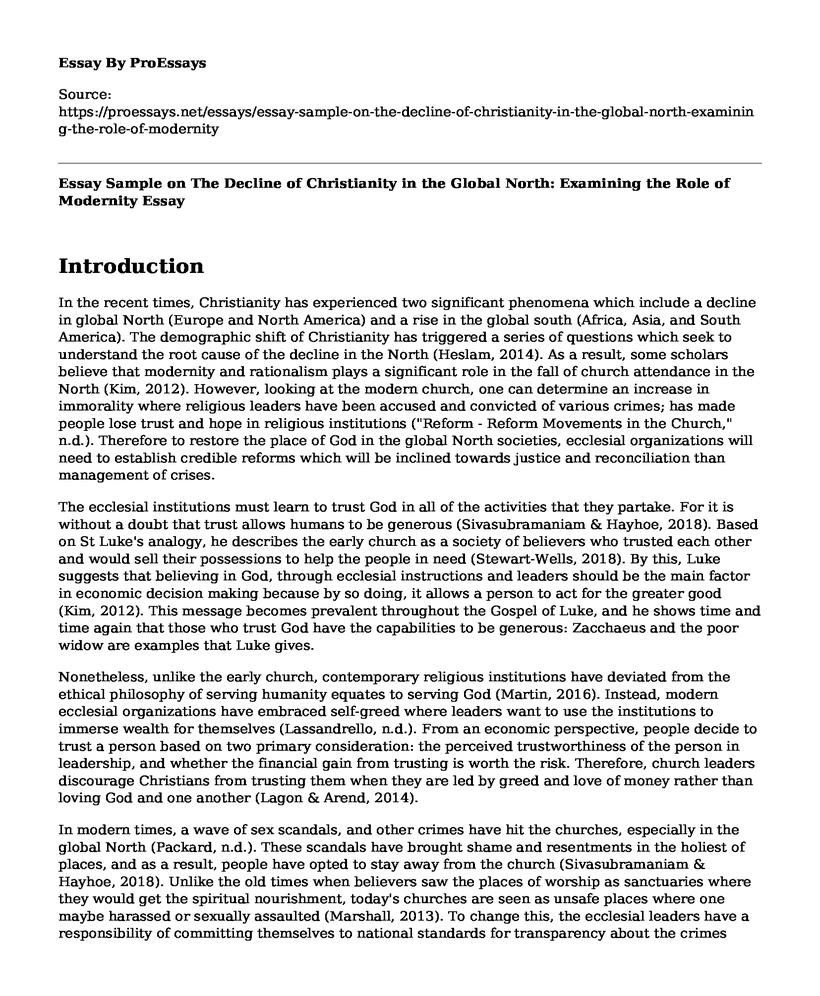Introduction
In the recent times, Christianity has experienced two significant phenomena which include a decline in global North (Europe and North America) and a rise in the global south (Africa, Asia, and South America). The demographic shift of Christianity has triggered a series of questions which seek to understand the root cause of the decline in the North (Heslam, 2014). As a result, some scholars believe that modernity and rationalism plays a significant role in the fall of church attendance in the North (Kim, 2012). However, looking at the modern church, one can determine an increase in immorality where religious leaders have been accused and convicted of various crimes; has made people lose trust and hope in religious institutions ("Reform - Reform Movements in the Church," n.d.). Therefore to restore the place of God in the global North societies, ecclesial organizations will need to establish credible reforms which will be inclined towards justice and reconciliation than management of crises.
The ecclesial institutions must learn to trust God in all of the activities that they partake. For it is without a doubt that trust allows humans to be generous (Sivasubramaniam & Hayhoe, 2018). Based on St Luke's analogy, he describes the early church as a society of believers who trusted each other and would sell their possessions to help the people in need (Stewart-Wells, 2018). By this, Luke suggests that believing in God, through ecclesial instructions and leaders should be the main factor in economic decision making because by so doing, it allows a person to act for the greater good (Kim, 2012). This message becomes prevalent throughout the Gospel of Luke, and he shows time and time again that those who trust God have the capabilities to be generous: Zacchaeus and the poor widow are examples that Luke gives.
Nonetheless, unlike the early church, contemporary religious institutions have deviated from the ethical philosophy of serving humanity equates to serving God (Martin, 2016). Instead, modern ecclesial organizations have embraced self-greed where leaders want to use the institutions to immerse wealth for themselves (Lassandrello, n.d.). From an economic perspective, people decide to trust a person based on two primary consideration: the perceived trustworthiness of the person in leadership, and whether the financial gain from trusting is worth the risk. Therefore, church leaders discourage Christians from trusting them when they are led by greed and love of money rather than loving God and one another (Lagon & Arend, 2014).
In modern times, a wave of sex scandals, and other crimes have hit the churches, especially in the global North (Packard, n.d.). These scandals have brought shame and resentments in the holiest of places, and as a result, people have opted to stay away from the church (Sivasubramaniam & Hayhoe, 2018). Unlike the old times when believers saw the places of worship as sanctuaries where they would get the spiritual nourishment, today's churches are seen as unsafe places where one maybe harassed or sexually assaulted (Marshall, 2013). To change this, the ecclesial leaders have a responsibility of committing themselves to national standards for transparency about the crimes committed in the church. After the establishment of the wrongdoing, the leaders must include laypeople, especially people affected, in the meetings where decisions are made (Neuberger, 2018).
Conclusion
In conclusion, instead of the religious institutions covering the crimes committed, they should be in the frontline to ensure that those who have failed to uphold the rules of the church are held accountable. The contemporary religious leaders must acknowledge that humanities trust and hope will be restored when church responds more as a community seeking justice for the atrocities committed in the name of religion than as an institution managing a crisis.
References
Heslam, P. S. (2014). Christianity and the Prospects for Development in the Global South. Oxford Handbooks Online. doi:10.1093/oxfordhb/9780199729715.013.019
Kim, E. J. (2012). The Rise of the Global South: The Decline of Western Christendom and the Rise of Majority World Christianity. Eugene, OR: Wipf and Stock Publishers.
Kim, H. (2012). The Shifting Center of Christianity and the Theology of Tao. Asia Review, 2(2), 15. doi:10.24987/snuacar.2012.12.2.2.15
Lagon, M. P., & Arend, A. C. (2014). Human Dignity and the Future of Global Institutions. Washington, DC: Georgetown University Press.
Lassandrello, J. (n.d.). Reconciling Within A Changing Church: How Do We Move Forward? doi:10.2986/tren.033-0796
Marshall, K. (2013). Global Institutions of Religion: Ancient Movers, Modern Shakers. London, England: Routledge.
Martin, D. (2016). Christianity in Europe and North America: Decline, Transition, or Pluralization? The Wiley Blackwell Companion to World Christianity, 719-732. doi:10.1002/9781118556115.ch53
Neuberger, J. C. (2018). Christianity. Caring for Dying People of Different Faiths, 19-28. doi:10.4324/9781315378619-3
Packard, J. (n.d.). The Emerging Church: Intentionally Marginalised Community. Handbook of Global Contemporary Christianity, 317-335. doi:10.1163/9789004310780_016
Reform - Reform Movements in the Church. (n.d.). Sacramentum Mundi Online. doi:10.1163/2468-483x_smuo_com_003671
Sivasubramaniam, M., & Hayhoe, R. (2018). Religion and Education: comparative and international perspectives. Symposium Books.
Stewart-Wells, A. G. (2018). Religion and Higher Education in Europe and North America. International Journal of Christianity & Education, 22(3), 300-301. doi:10.1177/2056997118790200
Cite this page
Essay Sample on The Decline of Christianity in the Global North: Examining the Role of Modernity. (2023, Jan 25). Retrieved from https://proessays.net/essays/essay-sample-on-the-decline-of-christianity-in-the-global-north-examining-the-role-of-modernity
If you are the original author of this essay and no longer wish to have it published on the ProEssays website, please click below to request its removal:
- Contrasting Viewpoints of the Two Religions: Buddhism and Hinduism
- Compare and Contrast Essay on Funeral Rites of Hinduism and Christianity
- Is Islam a Peaceful Religion? - Paper Example
- The Pagan Influence on Christianity Essay Example
- Spinoza's Philosophy on Problems of Desire and Freedom
- Essay Example on ISIS: Rising to Power & Impact on Islamic Religion
- Hinduism: A Unifying Force in Universal History? - Essay Sample







